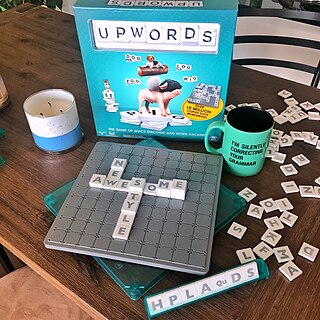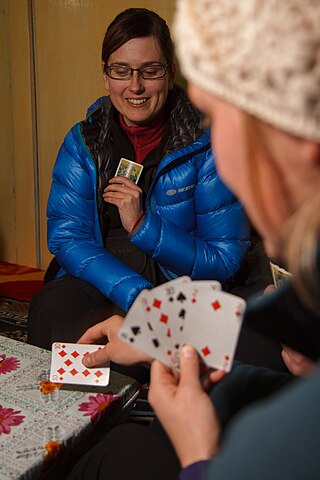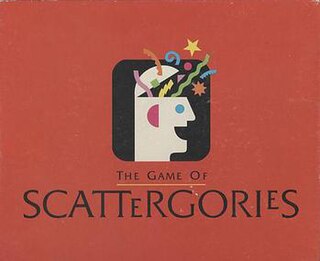
The Arabic alphabet, or Arabic abjad, is the Arabic script as it is codified for writing Arabic. It is written from right to left in a cursive style and includes 28 letters. Most letters have contextual letterforms.

The Latin alphabet, also known as the Roman alphabet, is the collection of letters originally used by the ancient Romans to write the Latin language. Largely unaltered with the exception of extensions, it forms the Latin script that is used to write many modern European languages, including English. With modifications, it is also used for other alphabets, such as the Vietnamese alphabet. Its modern repertoire is standardised as the ISO basic Latin alphabet.

Scrabble is a word game in which two to four players score points by placing tiles, each bearing a single letter, onto a game board divided into a 15×15 grid of squares. The tiles must form words that, in crossword fashion, read left to right in rows or downward in columns and are included in a standard dictionary or lexicon.

UPWORDS was invented by Elliot Rudell. The gameboard version of UPWORDS, as of 2018, is under license to Spin Master by Rudell Desiign, LLC. UPWORDS was originally manufactured and marketed by the Milton Bradley Company, now a division of Hasbro, which at different times marketed UPWORDS under its own name and also as Scrabble Upwords in the United States and Canada; and Topwords, Crucimaster, Betutorony, Palabras Arriba and Stapelwoord in other countries. Upwords and Hurry Upwords are available as digital gaming apps developed by Lonely Star Software under license by Rudell Design. HURRY UPWORDS can be played on the Skillz gaming site that offers free "Practice" games as well as wager-to-win "Pro" gaming.

Anagrams is a tile-based word game that involves rearranging letter tiles to form words.

Boggle is a word game in which players try to find as many words as they can from a grid of lettered dice, within a set time limit. It was invented by Allan Turoff and originally distributed by Parker Brothers. The game is played using a plastic grid of lettered dice, in which players look for words in sequences of adjacent letters.

President is a shedding card game for three or more, in which the players race to get rid of all of the cards in their hands in order to become "president" in the following round. It is a Westernized version of Chinese climbing card games such as Zheng Shangyou, and the Japanese Daifugō.

Jotto is a logic-oriented word game played with two players, a writing implement, and a piece of paper with the alphabet on it. Each player writes a secret word and attempts to guess the other player's word.
Alphabetical order is a system whereby character strings are placed in order based on the position of the characters in the conventional ordering of an alphabet. It is one of the methods of collation. In mathematics, a lexicographical order is the generalization of the alphabetical order to other data types, such as sequences of numbers or other ordered mathematical objects.

A dreidel, also dreidle or dreidl is a four-sided spinning top, played during the Jewish holiday of Hanukkah. The dreidel is a Jewish variant on the teetotum, a gambling toy found in many European cultures.
The affine cipher is a type of monoalphabetic substitution cipher, where each letter in an alphabet is mapped to its numeric equivalent, encrypted using a simple mathematical function, and converted back to a letter. The formula used means that each letter encrypts to one other letter, and back again, meaning the cipher is essentially a standard substitution cipher with a rule governing which letter goes to which. As such, it has the weaknesses of all substitution ciphers. Each letter is enciphered with the function (ax + b) mod 26, where b is the magnitude of the shift.

Quiddler is a card game and word game created by Set Enterprises. Players compete by spelling English words from cards in hands of increasing size, each card worth various points. The game combines aspects of Scrabble and gin rummy. The word "Quiddler" is a trademark.
Scrabble variants are games created by changing the normal Scrabble rules or equipment.

Scattergories is a creative-thinking category-based party game originally published by Parker Brothers in 1988. Parker Brothers was purchased by Hasbro a few years later, which published the game internationally under its Milton Bradley brand. The objective of the 2-to-6-player game is to score points by uniquely naming objects within a set of categories, given an initial letter, within a time limit. The game is based on a traditional game called "Categories".
Variations of basketball are games or activities based on, or similar in origin to, the game of basketball, in which the player utilizes common basketball skills. Some are essentially identical to basketball, with only minor rules changes, while others are more distant and arguably not simple variations but distinct games. Other variations include children's games, contests or activities intended to help the player practice or reinforce skills, which may or may not have a competitive aspect. Most of the variations are played in informal settings, without the presence of referees or other officials and sometimes without strict adherence to official game rules.
BuyWord is a letter arrangement word game by American designer Sid Sackson. It is published by Face2Face Games.
Mariage or Mariagenspiel is a German 6-card trick-and-draw game for two players in which players score bonus points for the "marriage" of King and Queen of the same suit. The game, first documented in 1715 in Leipzig, spawned numerous offshoots throughout continental Europe and gives its name to the Marriage group of card games, the widest known of which is probably Sixty-Six. Many of these are still the national card games of their respective countries.

Lexicon is a word game using a dedicated deck of cards for 2 to 4 players published as a shedding card game.

Tug of Words is an American television game show that premiered on Game Show Network on November 8, 2021.












